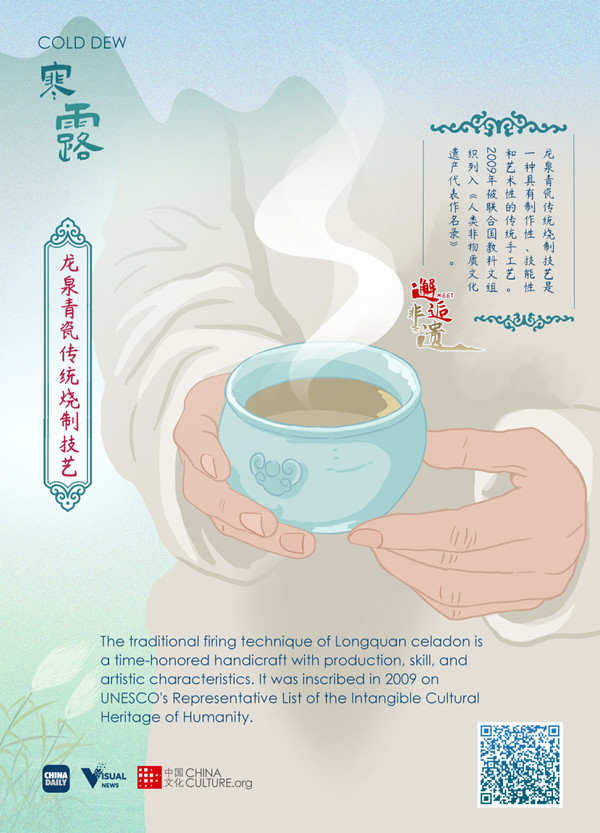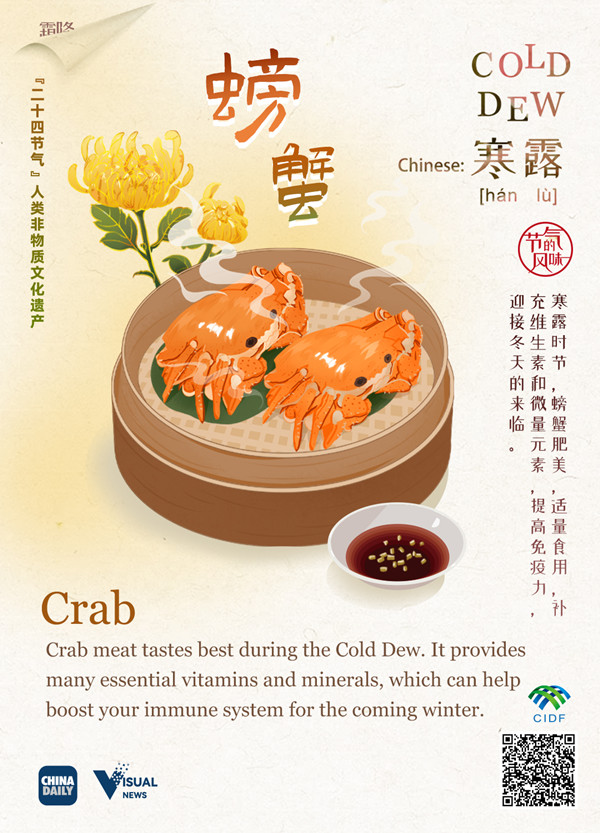Eight things you may not know about Cold Dew
The traditional Chinese solar calendar divides the year into "24 solar terms" (二十四节气, èr shí sì jié qì). Cold Dew (han lu), the 17th solar term of the year, begins this year on Oct 8 and ends on Oct 22.
Temperatures are much lower through this period than during White Dew in most areas of China. Dew is more abundant and colder, and there will be less rain. Autumn crops will be ripe.
Here are eight features of Cold Dew you should know.

Foggy autumn (雾深露重, wù shēn lù zhòng)
Temperatures drop significantly in October. When the cold air encounters autumn rain (冷空气来袭, lěng kōng qì lái xí), the abundant water vapor in the air soon reaches saturation before turning into misty rain or fog. When the humidity is high, many areas of China are covered in fog.
Season for fishing (捕鱼季, bǔ yú jì)
It is said that great fishing can be had in shallow water in autumn. That's because during the Cold Dew period, temperatures decrease quickly (气温迅速下降, qì wēn xùn sù xià jiàng) and the warmth of sunshine doesn't reach down into deep water. Fish swim to shallow water areas where the water temperature is relatively high.
Season for eating pomegranates (吃石榴, chī shí liu)
Pomegranates are ripe during Cold Dew. For centuries, pomegranates have been cherished for their exquisite beauty, flavor (味道, wèi dào), color (颜色, yán sè), and health benefits.
Season for drinking chrysanthemum wine (饮菊花酒, yǐn jú huā jiǔ)
Chrysanthemum is the iconic flower of Cold Dew. To prevent autumn dryness, many regions in China have the custom of drinking chrysanthemum wine. This is a tradition of the Double Ninth Festival (on the ninth day of the ninth month in the Chinese calendar), which often falls around Cold Dew. According to ancient records, drinking wine made with chrysanthemums, poria cocos mushroom, and pine oleoresin grants people long-lasting youth (青春永驻, qīng chūn yǒng zhù).
Season for eating hawthorns (吃山楂, chī shān zhā)
There is a saying that goes "It is time to harvest hawthorn during Cold Dew." Extracts of the berries have long been used in herbal medicine (草药, cǎo yào). The antioxidants in hawthorn are thought to boost heart health by strengthening blood vessels and stimulating blood flow.
A great time for hiking (远足, yuǎn zú)
During Cold Dew, North China takes on the look of late autumn with white clouds, red leaves, and early frost. On the day of the Double Ninth Festival (重阳节, chóng yáng jié), people often climb hills with cornel plants. This custom originated in the Eastern Han Dynasty (25-220) and is believed to dispel evils.
Season for making kippers (做腌鱼, zuò yān yú)
The people of the Dong ethnic group in western Hunan province have the custom of making kippers during Cold Dew. It is said that kippers made on the day of Cold Dew with accessory foods, such as rice wine, salt, glutinous rice, pepper powder, paprika powder, and ginger, are especially delicious (味道鲜美, wèi dào xiān měi).
Season for picking camellia seeds (采摘油茶籽, cǎi zhāi yóu chá zǐ)
Southern Hunan province is a famous area for producing tea seed oil. Going to the mountains to pick the seeds is prohibited before the arrival of Cold Dew.


